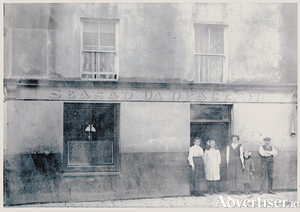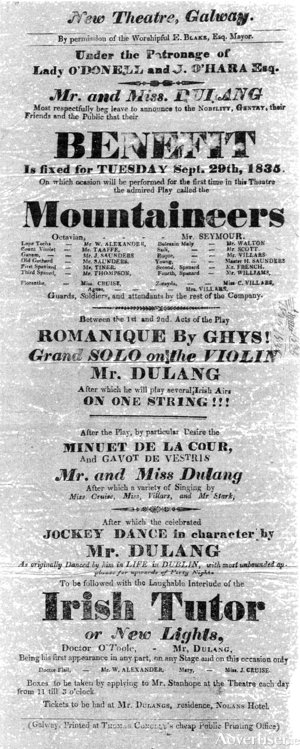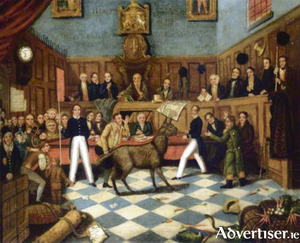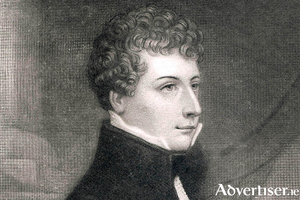Search Results for 'Richard Martin'
23 results found.
Seaghan Ua Neachtain

This iconic building dates from the late 16th or early 17th century. It has two-bay elevations on two streets, a beautiful three light oriel window with mullions and a transom in at the back. It also has a slight buttress or batter at the base of the outer wall, as has the building now occupied by Evergreen at the top of High Street. The premises has a long and interesting history.
Galway’s early association with the theatre

We know from the Corporation record books that theatrical performances were given in the Tholsel, the Town Hall of the day, as far back as 1619-20. These groups of ‘strolling players' were usually sponsored by local gentry and were regarded as an important feature of festive gatherings.
Galway event marks 200th anniversary of world’s first animal welfare law
A special ceremony took place outside Tigh Neachtain last Friday, July 22, to mark the 200th anniversary of the world’s first piece of legislation concerning animal welfare.
‘One of the most extraordinary persons’ Maria Edgeworth ever met

As the legendary Colonel Richard Martin neared the end of his life in Boulogne, where he had fled to escape his numerous creditors, a large four-horse carriage, on which two postilions, in jackets of dark-blue frieze, guided the coach on horse-back, arrived at the front door of Ballynahinch. It was dark, and its occupants were in a state of near exhaustion.
The turbulent life of Col Richard Martin MP - In three acts

Week IV. Further humiliation was heaped upon Colonel Richard Martin, who sought redress for the ‘dishonour to his bed, the alienation of his wife’s affection, the destruction of his domestic comfort, the suspicion cast upon the legitimacy of the wife’s offspring, and the mental anguish which the husband suffers’ (such was the legal language of the day), during his divorce trial against John Petrie, to be awarded only £10,000., exactly half of the £20,000. which he felt justified in demanding.
‘The best security for the honour of a wife, is prudence on the part of the husband.’

Week III. It took two years since Col Richard Martin’s wife Eliza eloped with John Petrie, a merchant, before the long process of divorce in the 18th century could begin. It promised to be a sensational case given the status of Martin, a larger than life character, one of the largest landowners in Ireland, his reputation as duellist, and his enormous popularity for his gift of mimicry and acting.
The French Revolution and the revolution in the Martin household

On the afternoon of July 14 1789 a mob unleashed its fury and frustration by forcing an entry into the Bastille, a medieval armoury, fortress and political prison in the centre of Paris. In the short but bloody battle that ensued some 98 of the mob were killed, as were three officers of the guard. Three more were lynched, and Marquis de Launay, governor of the prison, and the local mayor, Prevot de Flesselles, who had pleaded for peace, were stabbed to death and beheaded. Although the prison contained only seven inmates at the time of the storming, it was seen as a symbol of the monarchy’s abuse of power. It was the flashpoint of the French Revolution.
Wolfe Tone’s passionate love affair with Mrs Eliza Martin

One of the most intriguing pieces of theatrical memorabilia in Galway is the poster for two plays, Douglas and All the World’s a Stage, to be performed at Richard Martin’s theatre, Kirwan’s Lane, on Friday August 8 1783. The playbill shows the cast with included Martin himself, his wife Eliza (Elizabeth Vessey) and Theobald Wolfe Tone, who would become Ireland’s famous revolutionary, associated with the French inspired 1798 rebellion.
‘For the first time ever I felt fear in the theatre’

‘After a pantomime rehearsal one year I was asked to lock up as the director was in a hurry. A young lady asked me to allow her stay another while in the old Green Room to finish her costume. I reluctantly agreed, telling her to make sure that the lights and heaters were off before she left.
Humanity Dick’s biographer says new pedestrian bridge should honour him
Holidaying in Connemara just after the Millennium, I read one of those small grey boxes in the Rough Guide they use to give additional information about a specific location; in my case Ballynahinch Castle where I was having lunch. The description of a previous owner – Richard ‘Humanity Dick’ Martin - was intriguing.

